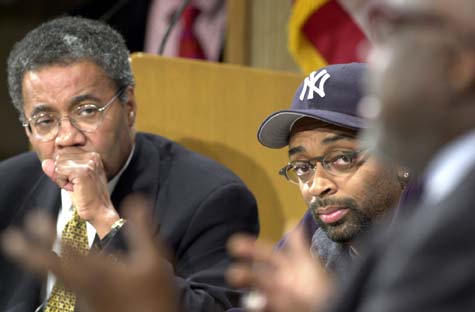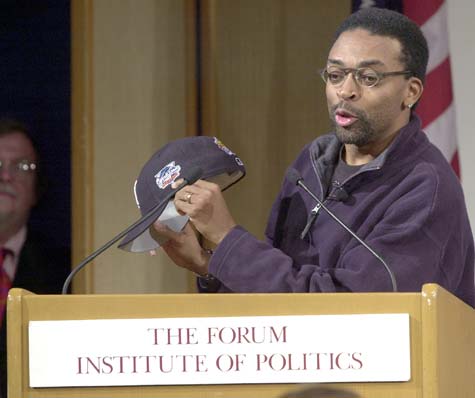Provocateur Lee ‘bamboozles’ KSG crowd

Those in the overflow audience at the ARCO Forum of Public Affairs at the Kennedy School of Government (KSG) who expected filmmaker Spike Lee to stamp his feet and scream out against racial inequity in Hollywood went home disappointed on Monday night.
Lee did more listening than talking while the themes raised in his latest film “Bamboozled” took center stage. The controversial story of a fledgling television network that develops a minstrel variety show using struggling black actors provided plenty of material for a lively roundtable discussion of race and the media.
Panelists included cultural and jazz critic Stanley Crouch; television producer and director Octavia Hudson AB ’71, Ed ’78, Ph.D. ’79; University of Chicago Professor W.J.T. Mitchell; and photographer Carrie Mae Weems. Alvin Poussaint, Faculty Associate Dean for Student Affairs at the Harvard Medical School (HMS), served as moderator for the event, which was co-sponsored by the Institute of Politics (IOP) and Harvard’s W.E.B. DuBois Institute for Afro-American Research.
Much of the discussion centered on Lee’s cinematic techniques, the use of satirical stereotypes in his new film, and the messages he’s attempting to deliver to his audience.
“What makes ‘Bamboozled’ important is that it speaks to the problem that all Americans have from coming out from under something that somebody else says you are,” Crouch said. “Where I thought Spike was extremely courageous was that he actually let some of those [minstrel] routines be funny.”
The audience viewed a brief clip of the film, including one scene in which two of the characters, played by Savion Glover and Tommy Davidson, don “blackface” for their stage act. While obviously uncomfortable viewing for the audience, the scene elicited some laughter along with the groans.
“You actually have to laugh at some of that. When you laugh, you see what minstrel shows do to black people – it is this horrific form in which you are dehumanized and you also become charismatic inside your own dehumanized stereotype, and that’s the grand complexity of the minstrel proposition,” Crouch explained.
Weems complimented Lee on both the subject and the style of “Bamboozled.” “There’s never a moment in the film when you are addressed as audience,” she said. “As the audience, you are endlessly engaged at looking at this material over and over and over and over. There’s no room. There’s no air. It is flat and in your face.
Hudson remarked on the “layered texture” in “Bamboozled” and in Lee’s other films, which often evoke strong emotions from their audiences.
“What’s important about Spike Lee’s work is that he can fill a room like this. It’s not just deconstructing what’s in that film, but what he provokes for the here and now and what we do with that,” Hudson continued. “I think it’s very important not to just look at a piece of work for what it is now. I think films and television and all of this can be catalysts for social action if you have an understanding about how it relates to you, and what you need to do.”

Lee addressed the historical context of black entertainers in America, explaining that many of them had “little or no choice” if they wanted to make a living in the industry.
“At the same time I was more understanding with [older actors] it really made me harsher with African-American athletes and entertainers today because we have a lot more choices,” he said. “Someone can take a job today and they’re not going to [play a role where they are] cleaning somebody’s house.”
The panelists also answered several provocative questions from the audience, including one from Christina Lewis ’02, who asked if actors and entertainers can use stereotypes to benefit not only themselves, but also their race.
Crouch delivered a passionate response.
“There is always a place for a black person to be [an ‘Uncle Tom’ character]. There is always a job for a woman to [show her body] for the camera. Those kinds of jobs are always there,” he said. “The biggest question in America is this: Can we achieve the ideal that everybody has a specific background but everybody is a mysterious individual whom we do not know until he or she arrives?”
When asked by Adam Taylor KSG ’01 how “institutionalized racism” in the entertainment industry can be eradicated, Lee pointed his finger at the top.
“The move we have to make is on the gatekeepers,” he said. “These are the people who decide what movies get made and which don’t get made, what’s on your television and what doesn’t get on, what goes on the front page of your paper and what gets buried on page eight …We have to exert whatever power we can on the people who make these decisions.”
For now, it seems, the gatekeepers have blocked Lee’s intention to produce a film about Jackie Robinson, who broke major league baseball’s color barrier in 1947. He’s been unable to obtain the financing necessary to complete the project. So Lee is working on a film about boxers Joe Louis and Max Schmeling while also developing a show for the USA Television Network.
Whatever Lee does next, however, chances are there will be some controversy attached. “From the very beginning, I never set out just to do positive images of black people. I really try to be more realistic, and I come under fire for that,” he said.




